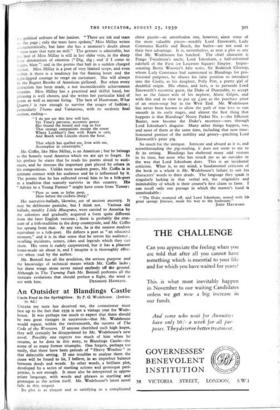An Outsider at Blandings Castle
Uncle Fred in the Springtime. By P. G. Wodehouse. (Jenkins. 75. 6d.) UNLESS my taste has deceived me, the connoisseur must face up to the fact that 1939 is not a vintage year for Wode- house. It was perhaps too much to expect that there should be two great vintages in succession—that Mr. Wodehouse would repeat, within the twelvemonth, the success of The Code of the Woosters. If anyone cherished such high hopes, they will certainly be disappointed by Mr. Wodehouse's new novel. Possibly one expects too much of him when he returns, as he does in this story, to Blandings Castle—the scene of so many former triumphs. One forgets, perhaps too easily, that there have been periods of "Heavy Weather" in that delectable setting. If one troubles to analyse them the cause will be found to lie, I believe, in an imperfect balance between deeds and words. In other words, a brilliant plot, developed by a series of startling actions and grotesque peri- peteias, is not enough. It must also be interpreted in appro- priate language, with words and phrases as startling and grotesque as the action itself. Mr. Wodehouse's latest novel fails in this respect.
Its plot is as elegant and as satisfying as a complicated chess puzzle—an unorthodox one, however, since some of the most valuable pieces—notably Lord Emsworth, Lady Constance Keeble and Beach, the butler—are not used to their best advantage. It is, nevertheless, as neat a plot as any that Mr. Wodehouse has hatched. The chief character is Pongo Twistleton's uncle, Lord Ickenham, a half-reformed rakehell of the First (or Leicester Square) Empire. Imper- sonating Bertie Wooster's bite noire, Sir Roderick Glossop, whom Lady Constance had summoned to Blandings for pro- fessional purposes, he abuses his false position to introduce into the Castle, as his daughter, Polly Pott, a pretty girl of doubtful origin. His object, and hers, is to persuade Lord Emsworth's eccentric guest, the Duke of Dunstable, to accept her as the future wife of his nephew, Marie Gilpin, and with this end in view to put up L50o as the purchase price of an onion-soup bar in the West End. Mr. Wodehouso has never been known to allow the path of true love to run smooth in its early stages, and almost the first thing that happens is that Blandings' Nosey Parker No. z—the Efficient Baxter, now become the Duke's secretary—secs through Lord Ickenham's disguise. Many other things happen, too, and most of them at the same time, including that now time- honoured pastime of the nobility and gentry—pinching Lord Emsworth's prize pig.
So much for the intrigue. Intricate and absurd as it is, and notwithstanding the pig-stealing, it does not seem to me to
fit its setting. Blandings has sheltered many odd visitors in its time, but none who has struck me as an outsider in the way that Lord Ickenham does. This is an incidental criticism. What is, to my mind, a fundamental criticism of the book as a whole is Mr. Wodehouse's failure to suit his characters' words to their deeds. The language they speak is singularly lacking in that verbal wit, the originality and inimitability of which is their creator's first claim to fame. I can recall only one passage in which the master's hand is unmistakable :
" The Duke stumped off, and Lord Ickenham, armed with hi. great sponge Joyeuse, made his way to the bathroom."
Jolix HAYWARD.








































 Previous page
Previous page